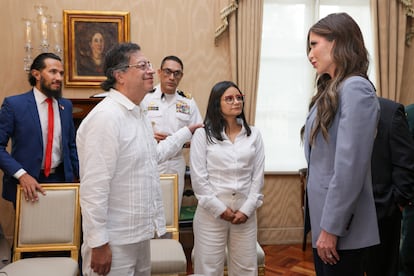Colombia visit by US Secretary of Homeland Security eases tensions between Trump and Petro
Kristi Noem meets with the Colombian president and exchanges words of praise with the foreign minister, Laura Sarabia. Both countries signed a deal for biometric data cooperation


US Secretary of Homeland Security Kristi Noem on Thursday made a point of publicly easing the tense relations between the Donald Trump and Gustavo Petro administrations during a visit to Bogotá, the second stop on her tour of Latin America. “This biometric data-sharing alliance will help us make an impact to assist Colombia and Colombians in identifying criminals along the borders,” she said in a brief statement from San Carlos Palace, the headquarters of the Foreign Ministry, in which she exchanged compliments with Minister Laura Sarabia. Both officials had a meeting in which they discussed security, drug trafficking, trade and human smuggling, and which produced a memorandum of understanding to share more information on migrants. In the afternoon, Noem met with President Petro, although further details were not disclosed.
“We will work alongside the Colombian people to ensure their security, provide opportunities for growth, and strengthen their economy in partnership with the U.S.,” Noem said at the press conference. She is the first senior representative of the Trump administration to set foot on Colombian soil since the Republican leader returned to the White House. She is also the first to do so since Bogotá and Washington clashed two months ago over repatriation flights, which Petro initially rejected due to the undignified treatment of deported Colombians. “We are committed to working hand in hand with our Colombian partners to improve not only border security, but also to support the enforcement of our immigration and criminal laws,” the secretary added, referring to Sarabia—who was standing a few feet to her right—as her “friend” and a “strong leader.” They were accompanied in the front row by both Colombia’s new Defense Minister, Pedro Sánchez, and the country’s ambassador to Washington, Daniel García-Peña.
The Colombian Foreign Minister expressed her gratitude for the meeting, which she described as “open, frank, and productive.” Before the cameras, they signed a MOU to advance a mechanism to strengthen immigration information-sharing, a document whose details are still unknown. The secretary emphasized that it involves the possibility of sharing biometric information, “which has already resulted in more than 1,700 deportations and 1,000 arrests.” This phrase was echoed verbatim by President Petro in his brief press release on the meeting, which also revealed that the president signed the declaration of intent for biometric data cooperation. At the conclusion of her visit to Colombia, Noem will travel to Mexico, where she will meet with President Claudia Sheinbaum.
The Secretary of Homeland Security’s friendly tone marked a contrast to the threat of tariffs that Trump had quickly threatened Petro with. Relations between the two capitals experienced a crisis on January 26 that was resolved in less than 24 hours. Luis Gilberto Murillo, Sarabia’s predecessor, burned his last diplomatic ammunition by leading the national effort to prevent Trump from imposing tariffs and sanctions on that turbulent Sunday, after Petro ordered the early morning return of two military planes carrying deported Colombians. The threat of tariffs alone brought the Colombian economy to the brink. Bogotá ultimately yielded to Trump’s demands, an early warning of the potential for disagreements between two presidents who are ideologically at odds and both addicted to speaking out on social media.
Since then, the expelled Colombians have been flying without chains or shackles, which Petro considers inhumane treatment, but they do so on flights paid for by Colombia. Tempers have cooled, although the South American country is also the most affected on the continent by the cuts to the cooperation agency USAID. Some 1,500 Colombians have returned to the country in these two months, equivalent to about half of the 3,788 nationals expelled from the United States during Trump’s first four years in office. Those numbers, however, pale in comparison to the nearly 30,000 Colombians deported during Joe Biden’s term, according to figures compiled by the newspaper El Espectador.
The fight against drug trafficking and migration are critical issues for the U.S. administration. The flow of migrants through the Darien jungle along the border with Panama and record levels of coca cultivation in Colombia are already anticipated as other sources of tension between Bogotá and Washington, traditionally close allies. Adding to the forecast is a possible U.S. “de-certification” of Colombia’s efforts against drugs, which is up for review in September, something that hasn’t happened since the presidency of Ernesto Samper (1994-1998). Colombian diplomacy is trying to avoid this at all costs.
Sign up for our weekly newsletter to get more English-language news coverage from EL PAÍS USA Edition
Tu suscripción se está usando en otro dispositivo
¿Quieres añadir otro usuario a tu suscripción?
Si continúas leyendo en este dispositivo, no se podrá leer en el otro.
FlechaTu suscripción se está usando en otro dispositivo y solo puedes acceder a EL PAÍS desde un dispositivo a la vez.
Si quieres compartir tu cuenta, cambia tu suscripción a la modalidad Premium, así podrás añadir otro usuario. Cada uno accederá con su propia cuenta de email, lo que os permitirá personalizar vuestra experiencia en EL PAÍS.
¿Tienes una suscripción de empresa? Accede aquí para contratar más cuentas.
En el caso de no saber quién está usando tu cuenta, te recomendamos cambiar tu contraseña aquí.
Si decides continuar compartiendo tu cuenta, este mensaje se mostrará en tu dispositivo y en el de la otra persona que está usando tu cuenta de forma indefinida, afectando a tu experiencia de lectura. Puedes consultar aquí los términos y condiciones de la suscripción digital.








































